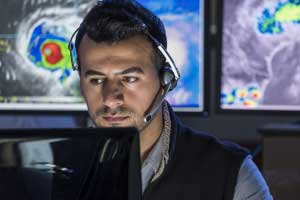Disclaimer: The information on our website is provided for general information purposes only. We make no representations or warranties of any kind, express or implied, about the completeness, accuracy, reliability, suitability or availability with respect to the website or the information contained on our website for any purpose. Any reliance on such information is therefore strictly at your own risk and we are not liable for any damages or losses arising out of or resulting from your reliance on any information contained on our website.
Meteorologists are scientists that study the atmosphere and how it is affected. Some meteorologists focus on research, while others educate the public on weather patterns and trends. These professionals provide data necessary for the public, governments, agriculture, and transportation industries to make informed decisions based on weather conditions that can impact the environment or community industries. Watch a video to learn what a meteorologist does:
How to Become a Meteorologist

A minimum of a bachelor of science degree is required to become a meteorologist. However, many go on to earn a masters or doctorate. Degrees can vary from atmospheric science to meteorology. Typical coursework includes chemistry, physics, mathematics, sciences, and computer programming. Those who want to be weather broadcasters may also include courses in broadcasting, news reporting, or mass communication.
In addition to the degree, it is essential to have analytical skills to look at data and write reports, strong communication skills to speak about data, critical thinking skills to predict or look at results, and mathematical skills to develop models/charts or calculate relationships.
It may also help to look for internships, volunteer, or find part-time work before graduating. Organizations such as the American Meteorological Society, World Meteorological Organization, and the National Weather Association may be a good starting point when exploring this career field. These organizations have information on fellowships, student resources, and offer great networking opportunities for those entering the meteorology field.
Job Description of a Meteorologist
According to the World Meteorological Organization and U.S. Bureau of Labor Statistics, various meteorologist options are available depending on your interest. Below are a few listed:
Broadcast meteorologists communicate weather forecasts, emergencies weather announcements, and report weather patterns on television, radio, and the Internet. They develop graphs, maps, and charts to report forecasts. However, keep in mind not all-weather broadcasters are trained in meteorologists or atmospheric scientists.
Weather forecasters are similar; however, they develop forecasts for the general public and specific corporations. For example, they may provide weather forecasts to electric companies to prepare for heightened electricity demands due to heat waves or snowstorms. They also monitor severe weather and give advanced warnings, predict whether temperatures and precipitation levels.
Forensic meteorologists work with law enforcement and the courts. They use weather data to determine or reconstruct weather conditions for a specific location and time. Forensic meteorologists collect data and investigate if weather played a role in unusual events such as car accidents or fires. At times, they may have to go to the courthouse, write legal documents, or even have to testify in a lawsuit.
Research meteorologists develop new or alternative methods of data collection, observations, and forecasting. They study how to improve or help the climate, weather, or other aspects that may affect the atmosphere. For example, some may research climate change and severe weather patterns. Consequently, looking at hurricanes and tornadoes to find better ways to predict them, or even environmental problems.
However, these are just a few job descriptions; all meteorologists evaluate data changing weather patterns no matter what type of meteorologists you are. Meteorologists collect data from various sources – such as radars, weather stations, and satellites. Some even have in-person observers throughout their coverage area that provide additional insight. After collecting this information, they share this information with others in the field or with the public. It is vital to explain to people what weather effects are occurring in an easy to understand way.
Meteorologists usually work full time, but more than often work overtime. They work holidays, nights, splits shifts, weekends, and can be on-call for severe weather events or emergencies. Meteorologists work in offices, studios, laboratories, and in a variety of outdoor conditions.
Meteorologist Career Video Transcript
Even before breakfast, and certainly before leaving the house, most people consult the weather forecast. That essential item of news is provided by atmospheric and space scientists, who study the weather and climate, and examine how those conditions affect human activity and the earth. Atmospheric scientists collect data from the field using instruments such as weather balloons, radar systems, and satellite imagery. Many write their own computer programs to model or predict weather developments, and advise the public or their clients on risks caused by weather events and climate change.
There are many types of atmospheric scientists. For example, weather forecasters use computer models to forecast short- and long-term conditions for airports, farmers, utility companies, and others. Climate scientists model climate change to help plan building design and adapt agricultural production to changing conditions. Atmospheric scientists generally work full time and may be called upon to work at odd hours, or overtime—keeping the public informed during severe weather or monitoring conditions around the clock at a field station. They may work in government weather stations, laboratories and offices, or television and radio stations.
Atmospheric scientists need a bachelor’s degree in meteorology or a related earth science field for most positions. To lead research or teach at the college level usually requires a Ph.D. or master’s degree in the field.
Career Article Resources
Bureau of Labor Statistics, U.S. Department of Labor, Occupational Outlook Handbook, Atmospheric Scientists including Meteorologists.
National Center for O*NET Development. 19-2021.00. O*NET OnLine.
The career video is in the public domain from the U. S. Department of Labor, Employment and Training Administration.
